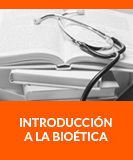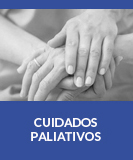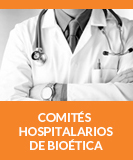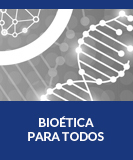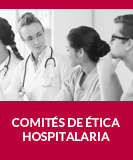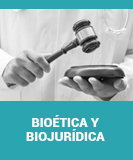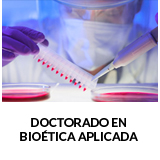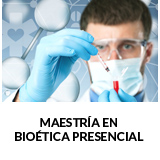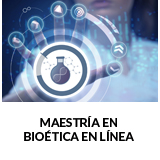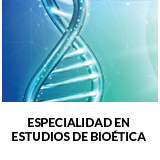
Versión en español
| MONTHLY NEWS | |
 |
|
|
Dr. Yael Zonenszain participates in the XVI National Forum and II International Forum on Health Education Experts in Palliative Care address the greFrom November 22 to 25, 2021, the Mexican Institute of Social Security (IMSS) inaugurated the "XVI National Forum and II International Health Education" in which more than 30 specialists from Mexico, Spain, Chile, United States and United Kingdom participated virtually to share their experiences and challenges in teaching during the COVID-19 pandemic in the form of keynotes, workshops, and good practices. |
|

|
|
|
The Faculty of Bioethics held the 14th Session of Querida Amazonia The Sherpa Romeo database houses periodical and peer-reviewOn this occasion we had the pleasure of having the presentation "Social Responsibility and Sustainability in the Economy" by Dr. Lorena Miranda, coordinator of the Latin American Center for Social Responsibility at the Universidad Anáhuac México. Dr. Lorena Miranda introduced the topic on corporate and governmental social responsibility, based on current needs in times of pandemic, modifying and improving the way we innovate and act in search of the welfare state and social solidarity to optimize operation of a community; It is from this search that social responsibility arises, which mediates society, the government and the business sector and seeks to ensure long-term sustainability; both of each individual and of the individual.
|
|
 |
|
|
The Living Will Online Course begins This course aims to generate spaces for learning, training, and reflection on decision-making about medical care at the end of life, identifying the living will as a tool to strengthen palliative care and the best accompaniment of patients. It also seeks to train health personnel and people interested in the study of Living Will from the perspective of making decisions about medical care at the end of life and the laws that support it.
|
|
| MONTHLY EVENTS | |

|
|
|
Check the upcoming events:
|
|
| MEDICINE AND ETHICS JOURNAL | |
 |
|
|
Without a doubt, bioethics is dynamic and it is based on the vertiginous advances of science and technology. However, we are witnessing a tie between these and ethical reflection, thanks to the constant questions about areas of human behavior that intervene in life and health. Thus, this issue gives an account of the role of bioethics as an essential science in the accelerated world of scientific changes, with topics ranging from concern for the success of medical treatments in the binomial of the doctor-patient relationship, to ethics in research, intrauterine interventions and their ethical and moral implications, reflection on the current understanding of patient autonomy and the challenges involved in thinking about a system and principles of global action from bioethics. In summary, this issue shares the concern to rethink what has been said and what has been raised so far in the bioethics of our time. In the first article, Robertha Mendoza raises the issue of therapeutic adherence in patients with chronic non-communicable diseases such as diabetes, hypertension and obesity, and reflects on the causes that lead patients to not comply with the treatments proposed by the professionals and the consequent deterioration of their health. The second article, by Ricardo Paéz, presents a new vein in the field of scientific research, which is the perspective from public ethics to determine the social value of research. Traditionally, the weighting of the ethics of biomedical research with human beings has been considered by means of the risk-benefit balance, but this represents an individualized vision that only considers the benefit for an individual, but not for a community, so to raise it from the Objectives of public ethics involve weighing the social value that will benefit not only an individual but a community. The third article in this issue represents a current discussion that is highly relevant to scientific advancement in relation to prenatal diagnosis and has to do with medical and surgical interventions in the fetus to correct congenital anomalies. Milagros D'Anna and Gustavo Páez take up the discussions raised about the human status of the embryo in the field of fetal medicine and surgical interventions in the fetus, highlighting the benefits derived from the early detection of anomalies and their consequent treatment. Victoria Fernández's article presents a first approach to the great challenge of "deterritorializing" the field and object of study of general bioethics, to return to the original intentions of Van Ranssaeler Potter, which had to do with the study of science life and health, through the implementation of global bioethics. The novelty presented by the author lies in thinking that the field of action of bioethics is not limited only to the biomedical sciences or the clinical field, but that its interest also lies in other realities, such as the understanding of the person in their social relations and, therefore, of the communities as a place of encounter and interpersonal growth, as well as of nature as a common home and of future generations. The last article, by Paola Buedo and Florencia Luna, proposes a rethinking of the traditional principle of autonomy of principlist bioethics with regard to decision-making in patients with mental disorders. The authors also warn about the precaution that must be taken in the concept of vulnerability, since it can also lead to imposed social stigmas that discriminate and do not favor respect for the person. Finally, this issue presents two reviews. In the first, Patricia Hernández addresses what was raised by Octavio Márquez regarding the relationships between neurosciences and neuro-bioethics, psychology and psychiatry, in order to address the study of mental health within the complexity of their relationships and from the perspective of the human person as a whole and under an inter and transdisciplinary methodology. In the second, José Enrique Gómez álvarez reviews the issues addressed by the National Bioethics Commission on its twenty-fifth anniversary, which have human rights as their backbone. From Editorial number 32, Vol. 4.
|
|
| ARTICLE | |
 |
|
|
The fetus as a
patient: different positions on the same concept.
|
|
| Resources and latest publications in Bioethics | |
 |
|
|
CONBIOETHICS RESOURCES: November catalog 2021
|
|
| Meet our researchers from the Faculty! | |
 |
|
|
Elsa Díaz
López Bioethics came as an immense door that was opened for me. It gave me opportunity for reflection, to emphasize the beneficence of our medical work and to work with the Gynecology and Obstetrics societies in aspects, such as, the importance of the impact of the medical act on the patient and on society. Also, to carry out different managerial activities for continuous work in the specialty in the entire scientific, bioethical, technical-digital field. Bioethics invites us Obstetricians Gynecologists to carry out a deep analysis on issues such as conscientious objection, abortion, euthanasia, surrogacy, embryo management, participation in research protocols, hospital bioethics committees, honor and justice committees, genetic manipulation, virtual medical consultation, etc., where bioethicists have a large field of expertise action. What have I enjoyed the most in the academic field? The projection of development areas combining bioethics, administrative and medical-scientific areas for individual benefit and thinking that it will be an act of common good. I have enjoyed all my projects but the one that has impacted me the most and motivated me to research has been the development and bioethical analysis of the synchronous medical teleconsultation in Obstetrics Gynecology, which we have worked with the Faculty of Biolaw at the University of Buenos Aires and it has been reflected in a digital book chapter, as well as with the support of the Anahuac University, work continues on topics such as anthropology of virtual communication and awaiting response from participation in global Bioethics forums and publication in an indexed journal. The support and direction of the professors of the Faculty of Bioethics, the invaluable direction of Father Cabrera and the joint sessions with the rest of the researchers of our university has allowed and encouraged me to continue learning. It has also help me to propose an interdisciplinary work that allows us to continue shaping joint projects of academic work with projections of social benefit and where Bioethics continues to be a fundamental guide for its development.
|
|
|
Openings: |
|
| Posgraduate | |
|
|
|
More information:
Facultad de Bioética
MPSS
Marcela Garibay
López
marcela.garibay@anahuac.mx
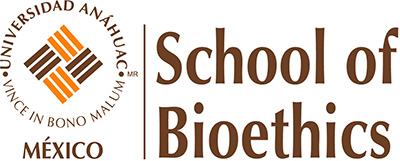
Follow us!


 Contáctanos
Contáctanos
 Contact us
Contact us

